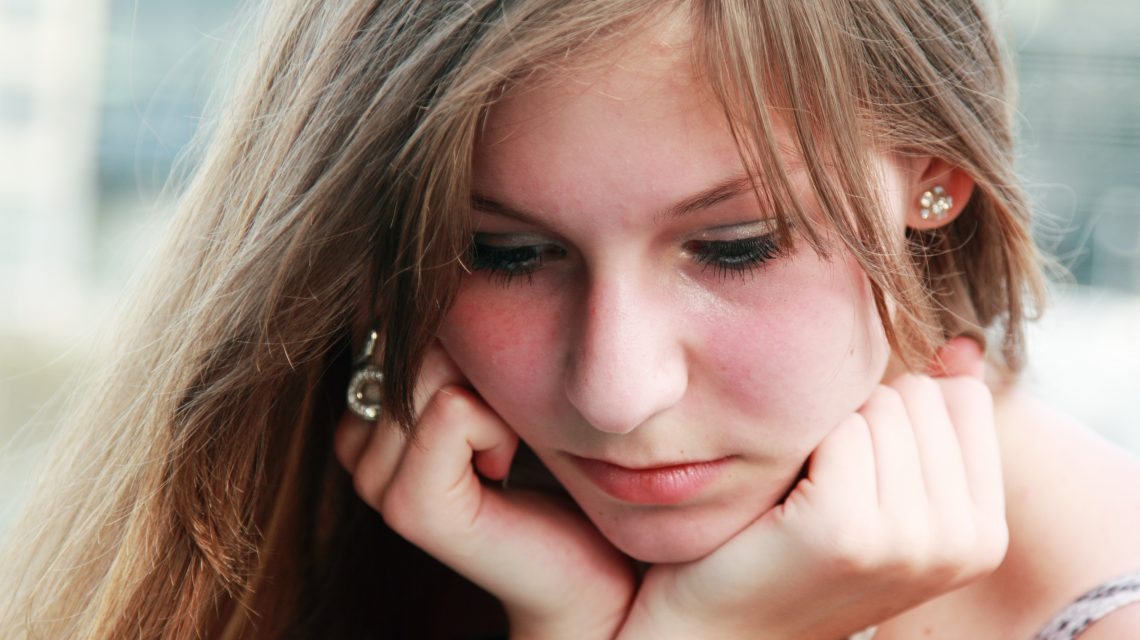How Acne Affects the Self-Esteem of Teenagers November 7, 2016 – Posted in: Beauty, Parenting
Adolescence is a crucial time for psychosocial and emotional development. It is also when your teen starts to experience significant changes in their self-consciousness. When teens have low self-esteem, it can lead to higher antisocial behavior, aggression, poor performance at school, lower economic success, and poor emotional and physical health.
Acne plays a huge role in your teen’s self-esteem, whether it is short-lived and mild or disfiguring and severe. As a parent of a teenager with acne, it’s important to understand how acne can impact how your teen feels on the inside, and what you as a mother can do to help.
Why and How Acne Affects Teenager’s Life
Acne is more than just a facial blemish for many teens, and probably your teen. Because it typically begins around puberty, having acne only adds to your teen’s uncertain feelings about her self-esteem, body image and other emotional issues she may be experiencing.
It’s important to keep in mind that when not taken care of properly, acne can also lead to scarring, which can affect her into adulthood and beyond. Since 85 percent of teens are affected with acne, it is likely that your teen is suffering with low self-esteem and emotional problems.
Physical attractiveness and appearance, unfortunately, have been linked to peer status. You know how important peer acceptance is to teenagers. Problems your teen could be facing include:
- Poor body image and self-esteem
- Feeling embarrassed
- Poor relationship building
- Social withdrawal
- Feeling frustrated
- Poor work and education habits
What’s more, according to a study published in the Journal of Cosmetic Dermatology led by Wake Forest University School of Medicine’s dermatology professor Dr. Steven Feldman, depression is almost 9 percent, or two to three times, more commonplace in people who had problems with acne compared to people who had clear skin.
According to Feldman, because acne is a huge problem and can affect how people perceive themselves, it can and does cause depression, which is why it’s essential to help get it under control for your teen.
How a Mother Can Help
The good news is that acne does not have to rule your teenager’s life. Your first step is to get her help. Therapy can help her tackle those self-esteem issues.
Tackling her acne can help improve not just her self-esteem, but her quality of life. Depending on the severity of your teen’s acne, you might simply need to have her use over-the-counter (OTC) acne products purchased at a drugstore or online. Or, in severe cases, she may have to opt for prescription acne care products.
Your teen might also need to visit a sympathetic dermatologist who will address your teen’s acne with possibly stronger OTC medications or antibiotics. Let the dermatologist know the acne is affecting your teen’s self-image, making her feel anxious and depressed and interfering in her social life.
On top of this, be compassionate and be her support system. Help her through this time to dispel feelings of hopelessness and isolation. In addition, let her know to be patient. It may take a few months once she starts an acne care routine for her acne to clear up.
Now, what if she is not consistent with her acne care? You can work with her to develop a daily acne care regimen she can stick with. Help her find the right treatment for her specific acne case.
Sharing one’s own experiences may help parents broach the delicate topic with their teen. Acne is known to have a hereditary correlation, so if a parent had acne growing up, his or her teen may be more prone to develop it as well. Knowing that a parent dealt with skin problems often helps teens realize that acne is common but not permanent.
How to Avoid Acne Getting Worse
There are some things your teen can do to prevent their acne from getting worse.
Your teen should:
- wash her face twice a day using an acne wash or mild soap and warm water.
- use oil-free products.
- avoid harsh cleansers, alcohol-based products, and alkaline bar soaps on her skin.
- not scrub her face, but rather, use gentle, circular motions and then rinse her skin off completely, patting it dry.
- use a non-comedogenic moisturizing lotion.
- avoid touching her face.
- use gentle shampoos and wash her hair often.
- use makeup sparingly, if at all.
- avoid picking pimples.
- shower as soon as possible after sporting activities.
- use acne care products.
Acne Care
Besides the lifestyle tips above that your teen can take to avoid her acne getting worse, there are some practical steps your teen can put in place today in terms of her diet and utilizing acne care products that can also help tremendously.
Diet and Acne Care
Good acne care starts with what your teen eats. More than 33 percent of people see a connection between what they eat and when they have a breakout. For some people, it may be eating chocolate that causes a pimple to surface. For others, it might be milk. The key is knowing which foods trigger breakouts in your teen and avoiding those.
Generally speaking, though, your teen should avoid highly processed foods. She should follow a low glycemic index diet, which involves fewer carbohydrates, less refined sugars and less sugar-containing foods and beverages. Your teenager should make sure that she eats lean protein and colorful vegetables daily, and drink plenty of water.
Acne Care Products
The skin care products your teen should use are oil-free SPF lotions, oil-free washes and acne fighters like benzoyl peroxide, retinol and salicylic-acid type products that are recommended by dermatologists. Now, it’s important to note that these are chemical-filled products and should only be used if absolutely necessary. You should also not use them for a prolonged time.
A good idea is to go with alternative natural & organic acne skincare products such as Manuka Honey Gel, Manuka Oil and Centella Face Serum. These are all friendly to the environment and are just as effective.
As her mother, confidant and number one supporter, you can help your teen combat acne and boost her self-esteem. Acne is typically not a permanent thing for most teenagers, and this alone might help her to stay positive during this time in her life.
About the Author
Elizabeth M. is a professional writer who holds an MBA. Liz focuses her writing on health news, medical conditions, healthy living, small business, career and work, and financial news. Her clients include The Motley Fool, LIVESTRONG.com, Healthline, HealthNews, Intuit Small Business Blog and many others. She’s author of multimedia App and Vook Conduct a Job Interview: The Video Guide.

